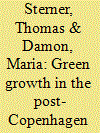|
|
|
Sort Order |
|
|
|
Items / Page
|
|
|
|
|
|
|
| Srl | Item |
| 1 |
ID:
111317


|
|
|
|
|
| Publication |
2012.
|
| Summary/Abstract |
This paper1 takes as its starting point the observation that fuel prices - and thus taxes - are important for good management of climate change and other environmental problems. To economists this should be no surprise yet it seems that the role of fuel taxation as an instrument of climate policy has not been fully appreciated. It is however one of the few policy instruments that, since several decades, has actually reduced fuel consumption appreciably. Thanks to taxation (mainly in Europe and Japan), carbon emissions are considerably lower than they would have been otherwise. In future where carbon emissions are to be cut drastically, this instrument will be crucial. There is however much opposition to the instrument. This opposition uses various arguments, for instance that fuel taxes hurt the poor since they are strongly regressive. We however find that the choice of country and methodology turns out to be of great consequence. We study seven European countries-France, Germany, United Kingdom, Italy, Serbia, Spain and Sweden and do find some evidence of regressivity but the evidence is very weak. It does not apply when lifetime income is used and it does not apply to the poorest country in the group. The best one-line summary is probably that the tax is approximately proportional.
|
|
|
|
|
|
|
|
|
|
|
|
|
|
|
|
| 2 |
ID:
110400


|
|
|
|
|
| Publication |
2011.
|
| Summary/Abstract |
Global climate change stands out from most environmental problems because it will span generations and force us to think in new ways about intergenerational fairness. It involves the delicate problem of complex coordination between countries on a truly global scale. As long as fossil fuels are too cheap, climate change policy will engage all major economies. The costs are high enough to make efficiency a priority, which means striving toward a single market for carbon-plus tackling the thorny issues of fairness.
Hopes for a grand deal were mercilessly shattered at Copenhagen in December 2009 and in other recent UNFCCC meetings, with the result that "green growth" is promoted as an alternative path. Indeed, green growth is clearly the goal, but it is no magic bullet. The world economy will require clear and rather tough policy instruments for growth to be green-and it is naïve to think otherwise. Growth, green or not, will boost demand for energy and coal is normally the cheapest source. The magnitude of the challenge is greater if we also consider the problems related to nuclear (fission) energy and, in some instances, to bioenergy (such as its competition for land that may be essential for the poor). This paper discusses some necessary ingredients for a long-term global climate strategy. As we wait for the final (and maybe elusive) worldwide treaty, we must find a policy that makes sense and is not only compatible with, but facilitates the development of such a treaty.
|
|
|
|
|
|
|
|
|
|
|
|
|
|
|
|
|
|
|
|
|